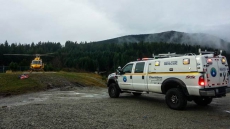Getting to know the BC Liberal Party leadership election candidates
For the second time in less than a year, British Columbians have to cast their votes. Members of the BC Liberal Party will return to the polls this coming February in order to elect the party’s next leader.
For 16 years, the BC Liberal Party was at the helm of the province. With the torch passed only once in that time period – from Gordon Campbell to Christy Clark in 2011 – the Liberal Party, as well as the people of the province, got used to seeing the same face in charge for quite a while. June of 2017 saw a historical general election bring about controversy and change to the familiarity that has governed B.C. for so long.
The Liberals fell one seat short of a majority government and, in turn, succumbed to the combined voices of the BC NDP and BC Green Party in a failed vote of confidence. Former B.C. Premier Christy Clark resigned as leader of the Liberal Party, a position she held for six-and-a-half years, sparking the process to elect a new party leader.
Six candidates announced their candidacy by the time the nominations closed, with results of the election due to be announced on February 3, 2018, after three days of voting. The candidates combined bring a vast wealth of knowledge and experience that they each believe will allow them to lead their Liberal party to a win over the NDP while pushing their priorities for the province. With a handful of debates under their belts and several months of campaigning, the candidates all hope their efforts will put them – and eventually their party – out on top.

Mike de Jong
"Experience, energy and a passion for building a future based on education in British Columbia. Serving on the teams of two leaders and premiers has given me the experience I need to deliver.”
What are Mike de Jong’s strengths when it comes to voting him in as the next leader of the BC Liberals? “Experience, energy and a passion for building a future based on education in British Columbia,” he says. As a former cabinet minister under the BC Liberal government for all 16 years of their latest run, de Jong has held a wide range of positions including minister of forests, minister of health, attorney general, and, most recently, minister of finance. De Jong is currently the MLA for Abbotsford West and previously ran for leader of the party in 2011, placing fourth.
PRO: “Serving on the teams of two leaders and premiers has given me the experience I need to deliver,” de Jong says on his campaign website. His experience over two terms comes with insight into how the government works and how it needs to work in order to hold the NDP accountable while continuing to build a strong economy. His previous roles will allow him to ensure a fiscally responsible government invests in the areas that he strongly believes will benefit all British Columbians.
CON: While his experience is of obvious value, de Jong’s former role as minister of finance from 2012-2017 may also put him at a disadvantage. The NDP’s policies that centred around affordability are believed to have helped lift them above the Liberals; de Jong’s careful spending has been criticized for restricting government programs that may have been attractive to voters in the last election. Members may be looking to distance themselves from the fallen government.

Todd Stone
"It’s time for new ideas built around the fundamentals that have made our BC Liberal Party successful. The same old tired approach isn’t going to work in the next election.”
Currently MLA for Kamloops- South Thompson, a position he’s held since 2013, Todd Stone has a “bold vision” for the future of British Columbia. “It’s time for new ideas built around the fundamentals that have made our BC Liberal Party successful. The same old tired approach isn’t going to work in the next election,” he says. “My plan ensures that we make strategic investments in the programs and services that make life better for families and improve communities while continuing to balance our budget, grow the economy, and maintain BC’s reputation as a great place to invest and do business.”
PRO: Stone brings experience as transportation minister, minister responsible for emergency management BC, and deputy government house leader. He has demonstrated he is capable, loyal and experienced but not entirely entrenched in the long-standing Liberal run that appears in need of a face lift. He realizes changes are necessary in order to get the job done but has cabinet experience to back up his big ideas.
CON: At 45, Stone is the youngest candidate running for the leadership role as well as the only candidate from outside of the Lower Mainland. It may take more convincing when compared to his counterparts, as the Liberals had the support of the older generations, who may be less inclined to vote for a younger candidate. Stone’s past as transportation minister has been called in to question as voters in the last election showed frustration over a lack of transportation improvements.

Dianne Watts
"I believe that my greatest strength is bringing people together. In order to solve problems and deal with tough issues, we have to bring all three levels of government together.”
From 2005-2014, Dianne Watts was the Mayor of Surrey, where she was well-known and well-liked. She was most recently the Conservative MP for South Surrey-White Rock which she resigned from in order to seek the leadership role of the BC Liberal Party.
PRO: If members are looking for a fresh start, they won’t have to look further than Watts. She is an outsider to the party without any current MLA support as of yet and that could be good news considering the amount of voters who have signalled their disappointment in the previous government and their readiness for change. Arguably the biggest name in the race, Watts has been a successful public figure for many years. “I believe that my greatest strength is bringing people together,” she says. “In order to solve problems and deal with tough issues, we have to bring all three levels of government together – municipal, provincial, and federal – as well as the community, experts and stakeholders. This method worked for our team in the City of Surrey, and I believe it can work on the provincial level as well.”
CON: While Watts brings much political experience, her lack of a plan for the future as well as her focus on the Lower Mainland could be her downfall. While other candidates released platforms and policies they’re eager to implement, Watts was criticized for being more than half way through campaigning without a plan. Watts has made an impact in and around Surrey but her localization and lack of province-wide experience may affect her connection to members outside the Greater Vancouver Area.

Michael Lee
"I bring a fresh perspective and a new approach, a more balanced approach to the BC Liberal party.”
A lawyer by profession, Michael Lee is currently the MLA for Vancouver-Langara. “I bring a fresh perspective and a new approach, a more balanced approach to the BC Liberal party,” says Lee. “One that believes that we should continue to build a strong economy but also continue to lower our carbon footprint, find ways to innovate and improve and make more effective our healthcare and educational systems as well as make the right kind of investments in infrastructure and social programs to help British Columbians.” His campaign slogan “Join Us” encourages a call to action for not only a unified party but also a unified province.
PRO: The BC Liberals need to be reenergized and Lee may be just the person to do so. While a newcomer to caucus, Lee has decades of political experience and community involvement, making him well-known within the membership but without a close connection to the fallen government. His lack of experience as a cabinet minister may serve him well as Lee has the potential to be popular with Vancouver’s business community as well as with voters throughout the province who struggled to identify with the promises and proposals of the long-standing Liberals of Clark’s era.
CON: While a positive for many, his newcomer status may lead some to believe he’s not quite up for the top job. People around the province may not be familiar with him despite his political involvement making a possible NDP defeat potentially more challenging. His subdued style may not be enough bravado to gain the backers he needs.

Andrew Wilkinson
"I have a very good understanding of how this province works and it allows me to ask people the questions about how to make things better in their communities.”
Former attorney general, minister of advanced education, and minister of technology, innovation and citizens’ services, Andrew Wilkinson is a doctor and lawyer by profession, and currently the MLA for Vancouver-Quilchena. His campaign slogan “#forallofBC” speaks to what he believes to be one reason why members should vote for him but also demonstrates his passion for the province. “The reason I’ve taken this on, the reason why I’m doing it,” he says, “is to make sure every British Columbian has the kind of bright future that my family found when we immigrated to Canada when I was four years old.”
PRO: “I have lived and worked all over British Columbia,” Wilkinson says. “And so I have a very good understanding of how this province works and it allows me to ask people the questions about how to make things better in their communities.” Wilkinson’s experience – professionally, around the province and in three different ministries – has gained him the support of more MLA’s than all the other candidates combined. His insider experience, without the blame that several other candidates are under fire for, has combined with a well-run campaign and increased his popularity among members.
CON: While Wilkinson is well-educated, well-prepared and well-supported, he may not have a bold enough vision to capture the attention of those looking for a change. His opponents are positioning him as elitist and out-of-touch with voters, especially the younger ones, whose votes will be necessary for an NDP defeat.

Sam Sullivan
"We need a leader who can bring an opposition party from opposition to government and I’ve done that. My goal is to complete the work that I started.”
Since 2013, Sam Sullivan has been the MLA for Vancouver-False Creek. While he has held the position of president of the Global Civic Policy Society as well as an adjunct professor with the UBC School of Architecture and Landscape Architecture, Sullivan is perhaps most well-known for his role as the Mayor of Vancouver from 2005-2008. “We need a leader who can bring an opposition party from opposition to government and I’ve done that,” he says, referring to his role as leader of the Non-Partisan Association (NPA). As mayor, Sullivan had two main policy initiatives: an EcoDensity program and CAST, a program aimed at addressed drug-related fatalities. “My goal is to complete the work that I started,” Sullivan says.
PRO: “Some people say that people are worried about getting insiders, that they want a change. And others say that they don’t want a complete outsider, one that has no background at all. And so I guess I could say that there’s only one person that fits that bill,” says Sullivan. His loyalty to the caucus without a cabinet position has provided Sullivan with an abundance of political experience without the decision-making roles that may tie others to the defeated government. He also brings about experience with electoral reform.
CON: Sullivan’s lack of experience as a cabinet minister may be enough for members to overlook his other assets and achievements. His ideas for the future of the province may be overshadowed by his competitors who appear to have bigger, bolder ideas when it it comes to changes for both the party and the province.





